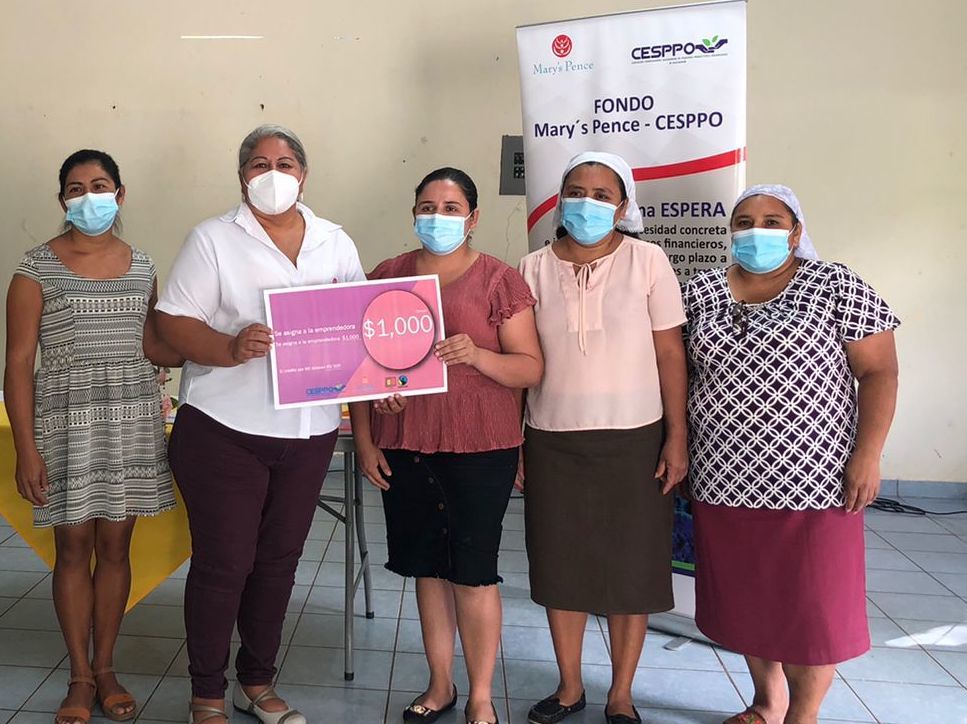
According to ESPERA’s newest partner, the Asociación Coordinadora Salvadoreña de Pequeños Productores Organizados (CESPPO), funding from ESPERA for women’s small business loans was the final piece that was needed to fully implement their program for gender justice and inclusion.
Based in El Salvador, CESPPO is part of the Latin American and Caribbean Network of Fair Trade Small Producers and Workers (CLAC). Established in 2004, CLAC represents and promotes the interests of nearly 850 “Fairtrade” certified organizations and their 352,351 producers within its network of 24 countries. Although all producers–men and women–are invited to participate in CLAC, an overwhelming majority of the members are men. CLAC is actively working to change that–in part by offering programs to intentionally welcome and empower women, as well as addressing the culture of machismo through educational programs for men.
CESPPO is a branch of CLAC that is responsible for the coordination of member organizations throughout El Salvador. CESPPO supports the member organizations’ overall business strategies, as well as ensures that they are addressing issues outlined in CLAC’s overarching vision, including the focus on gender justice and inclusion–for members and their families.
CESPPO staff Ruby and Claudia explain that it is common for women to be excluded from participation in business ownership on multiple basic levels, most often as a result of cultural norms and social expectations. As an example, Ruby explains that very few women can own land. Most land for agricultural purposes is passed down through inheritance–from a father to a son. It’s expected that a daughter will get married and move in with her husband. And obtaining a loan from the bank to purchase land–or obtain start-up capital for a business initiative–is nearly impossible for a woman without formal employment.
Ruby and Claudia were part of the CESPPO team in El Salvador that developed a pilot program to address gender equity within CLAC’s Fairtrade network. The program offers women–both members of CLAC and wives or daughters of CLAC members–with the opportunity to strengthen leadership skills and business skills within the context of understanding the realities of women in El Salvador.
As a result of CESPPO’s program, women participants considered ways they could develop their own businesses–either directly involved with Fairtrade agriculture, or businesses that would supplement their family’s agricultural business in the off-season. Ideas for business start-up initiatives were plenty, but funding was non-existent. Then ESPERA got involved.
Since becoming an ESPERA partner in 2020, 27 women who participate in CESPPO’s program have received loans to start their own businesses. The businesses range in size and scope, but include a home fruit delivery service, a bakery, a small school and office supply shop, and a fresh juice stand. Some are joint ventures owned and operated by friends or pairs of sisters.
Sandra, Alicia and Francisca are friends who sell clothing for women, men, and children that is all made using indigo dye. The women have a small workshop located on land that belongs to them where they make the dye and color the clothing products. In addition to selling their hand-dyed clothing in the workshop, they also sell their clothing in a shop that looks out over Lake Coatepeque in Santa Tecla, El Salvador.
More than the economic support that the businesses provide the women and their dependents, the program provides individualized and group accompaniment, as well as foments solidarity among the participating women. Through this experience, Claudia explains, women meet one another and share their life experiences, which in turn generates confidence in each of them as they discover a system of support within their relationships as mothers and daughters, sisters, cousins, and friends. “It’s a joy to see the women and how happy they are and to see how well this program works for them,” says Claudia. It grows their self-esteem and sense of self worth and belonging.
Ruby agrees. Personally, she’s been very satisfied to see the advancement of women’s rights and participation. The program, she says, allows both women and their male counterparts to recognize the abilities and contributions of women and to see how much they can accomplish–together.
“Change is slow,” Ruby admits. “But to see the change happening in the lives of people–despite all the challenges–that is what motivates us to continue.”
